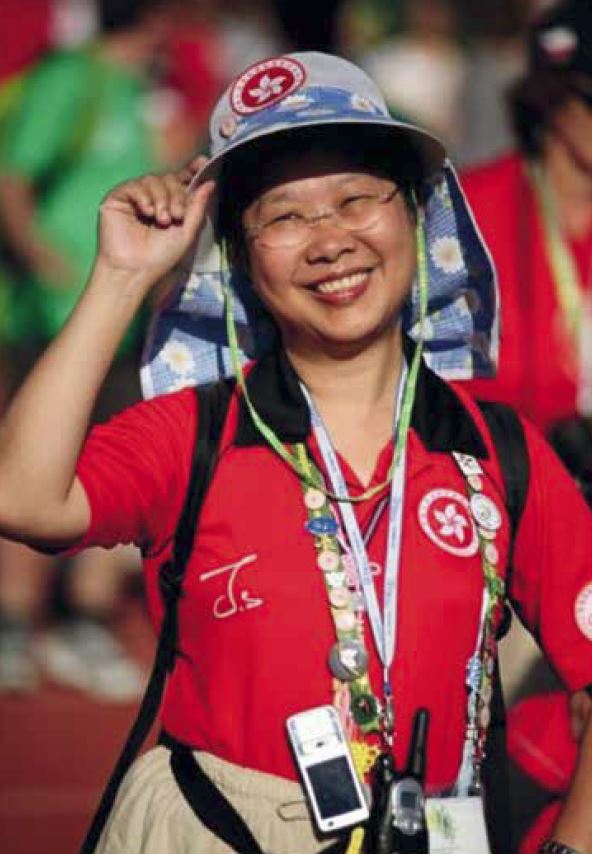Hong Kong Academy of Medicine. CC BY-NC-ND 4.0
HEALTHCARE FOR SOCIETY
Games supporting organ donation: an interview with Dr Ka-foon Chau
Chui-ching Chan1; Marco Cheung2; Michelle Tsui3
1 Year 6, The Chinese University of Hong Kong
2 Year 5, The University of Hong Kong
3 Year 4, The Chinese University of Hong Kong
What would you do if your son only had one more
day to live? It was this cliched question that prompted
Dr Ka-foon Chau to dedicate her life in advocacy of
organ transplantation.
Organ transplantation is an age-old topic, with the
first renal transplant reported in 1969. However,
the rate of organ donation in Hong Kong is low:
with only six donors per million population, Hong
Kong lags behind many developed countries in this
respect. For the past 40 years, Dr Ka-foon Chau,
Head of Division of Nephrology at the Department of
Medicine, Queen Elizabeth Hospital, Hong Kong, has
worked ceaselessly for her lifelong mission of organ
transplantation. Dr Chau, also honorary president
of Hong Kong Transplant Sports Association and a
member of the Committee on Promotion of Organ
Donation, gives us a chance to see behind the scenes
of organ procurement and the limiting factors in
Hong Kong.
Forty years ago, organ donation was not a
popular concept. Dr Chau recounts a tearful story
that sparked her lifelong mission. While she was
still a junior doctor, resources were so limited that patients who were unmarried or without children
were denied dialysis. Among those denied treatment,
some women committed suicide because they could
not work or have children, and were incessantly
rebuked by their in-laws. There were also young men
who were in chronic pain. Dr Chau covertly helped
to give peritoneal dialysis to one of these young men
who was only in his twenties. After some time, his
abdomen was so scarred she could not find a clear
space to insert another needle. She spent the last
few hours of his life by his side. Dr Chau remembers
that he never had a word of complaint, although he
was in so much pain. She thought at that time that a
kidney would have eased his suffering.
“No matter what your calling is, go
for it whole-heartedly.”
Dr Chau thus plunged headfirst into organ donation.
She joined training workshops and liaised with the
Hospital Authority and the Hong Kong Government
about the topic. She also led her nephrology team
into proactive organ procurement. Nonetheless,
while organ donation has evolved to become a more commonly discussed topic, there remains a gap
between theoretical understanding and concrete
practice. In 2008, Dr Chau inaugurated the Hong
Kong Transplant Sports Association, with a vision
to improve rehabilitation after transplant surgery,
to acknowledge the families of organ donors, and to
raise awareness of organ donation in society.
She led the first team of transplant patients
from Hong Kong to the biennial World Transplant
Games in Bangkok, Thailand. Since then, the
popularity of the Games has flourished in Hong
Kong and internationally. Competitors from
Hong Kong have won medals in the Games, and
have participated in a wide variety of regional and
international championships. For patients, the
Games are a strong incentive to exercise, paving the
way to better rehabilitation; for donors and their
families, the Games provide acknowledgement for
their altruistic contributions with vivid, breathing
examples. In 2012, Dr Chau coordinated the Hong
Kong Transplant and Dialysis Games. This local
addition gives more incentive to rehabilitate, and
allows for greater connection between transplant
recipients and donor families, whose participation is
also welcomed. The Games is a powerful testimony
to those involved in organ donation, showing the
world the life-giving impact that organ donation
can make. Perhaps most importantly, the Games
reorients any misconceptions and reasserts that
transplant patients can achieve many things.
“If I don’t give up, why should you give up?”
After retirement, Dr Chau is still an unfalteringly
passionate advocate of organ donation. Despite
years of hard work, the organ donation rate in
Hong Kong still remains low. Transplant medicine
not only necessitates the transplant itself, but
a multidisciplinary approach ranging from
psychological support for donor families to hospital
management for efficient organ procurement and policy making for better delegation of resources. The
limited availability of intensive care unit beds, lack
of organisation in organ procurement, unsupportive
government bodies, and the conservative local
culture are still major barriers to organ donation.
There have been times when Dr Chau has felt
helpless, and she cheerfully accounts her unyielding
passion to the like-minded friends who gave her a
pat on the shoulder and cheered her on. This seems
to be her outlook of life: we are all here to help each
other out.
The recent coronavirus disease 2019
(COVID-19) pandemic casts a lot of uncertainty
and challenges on the healthcare system, yet
Dr Chau is not staying idle. She is now preparing
her first broadcast on RTHK, titled: “The ‘New’
Breakthrough of Transplants”, which will be aired
between July and September 2020. Please tune in to
her broadcast!
What you can do, even from home
Dr Chau’s enthusiasm in her work inspires us to
strive for better care for our patients. “No matter
what your calling is—it does not have to be in organ
transplant—if it is a good and noble cause, go for it
wholeheartedly, and you will be working directly or
indirectly for organ transplantation too.” We can all
play a role in this movement by signing up ourselves,
sharing with family members, or even volunteering
at the Transplant Games. There is always something
we can do to improve our patients’ care.
Find out more about organ donation and sign
up as an organ donor at: https://www.organdonation.gov.hk/eng/home.html
Tune into “The New Breakthrough of
Transplants” airing 6 July to September 2020 at RTHK
Details of the World Transplant Games
Federation can be found at: https://wtgf.org/


